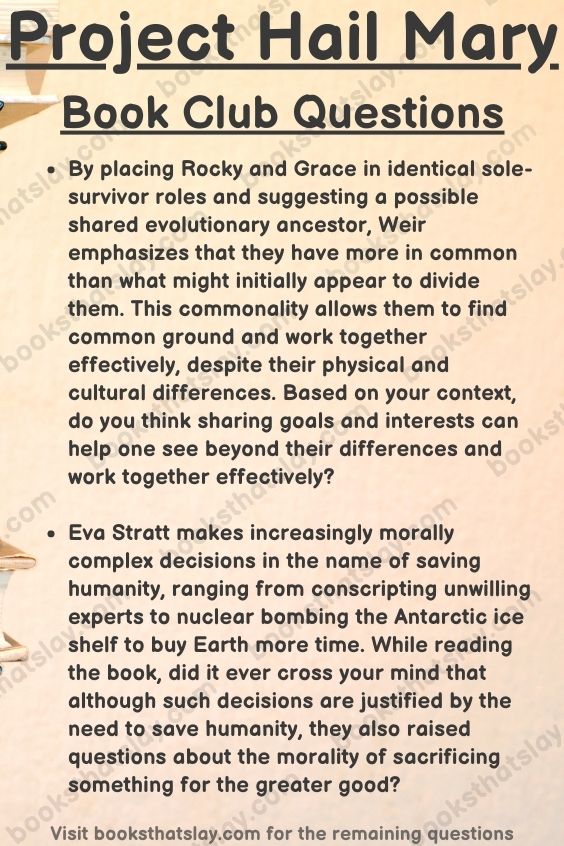15 Project Hail Mary Book Club Questions For Discussion
Imagine this super trippy scenario: you wake up far, far away from home with a bunch of dead people, and you have zero clue who you are or what’s going on. That’s the crazy start to “Project Hail Mary” and this poor guy Ryland Grace is stuck in it!
Ryland’s gotta save the world from a huge threat, and he’s gotta use science and smarts to do it all on his own.
Or is he really on his own?
Let’s talk about all the wild stuff in this book and why you’ve gotta read it if you’re into crazy sci-fi adventures.
Here’s the deal: Andy Weir, the author, is a total genius and you will understand his intellect even better when you discuss these book club questions with your fellow bibliophiles.

Project Hail Mary Book Club Questions
- The novel grapples with the concept of ‘sacrifice for the greater good’. Stratt embodies a utilitarian approach where any sacrifice is justified to save humanity. Grace is more hesitant and weighs individual lives against the potential good. Do you agree more with Stratt’s philosophy, or do you feel her actions are morally questionable? Were her methods, like secretly drugging Grace, necessary for the mission’s success?
- The novel presents a tension between rigorous, methodical science and wild, speculative theorizing. Grace is dismissive of established science while his own outlandish ideas often succeed. Could major scientific breakthroughs be achieved without taking risks, or is speculation sometimes justified even when it seems dangerous?
- Grace’s actions, fueled by unchecked assumptions, often have negative consequences (like nearly killing Rocky). Yet, some level of assumption is necessary for science. How can scientists strike a balance between necessary guesswork and avoiding dangerous assumptions? At what point should caution outweigh the pursuit of a potential breakthrough?
- Collaboration transcends cultural differences on Earth and plays a vital role in survival in the Tau Ceti solar system. Is this portrayal of overcoming cultural barriers for a common goal realistic, or overly simplified? In reality, would cultural differences pose a bigger hurdle in such a dire situation, or is the novel’s optimism about cooperation justified?
- The novel hints at Eridians and humans possibly having a common ancestor. This lessens the ‘alien’ feel of Rocky and emphasizes similarities between their species. If this shared ancestry is true, does it make the decision to save BOTH worlds easier for Grace, since he feels greater kinship with Rocky as a result? Does this potential connection speak to a universal theme about the nature of intelligent life?
- Eva Stratt’s decisions raise serious questions about morality in times of crisis. Consider her actions like conscripting unwilling personnel, manipulating Ryland Grace, and nuking Antarctica to buy time. Discuss the ethics of sacrificing a few to save many and whether Stratt’s approach justifies the ends or whether her methods cross the line despite the high stakes.
- Ryland Grace spends much of the novel with amnesia, slowly rediscovering himself and his role in the mission. How does this narrative choice impact the unfolding of the story, the reader’s perception of Grace, and his character development? Does regaining his memories resolve his inner conflict between cowardice and heroism, or is his character ultimately defined by his actions during the mission?
- Grace and Rocky develop a remarkable interspecies friendship despite vast biological and cultural differences. What challenges do they overcome to build understanding and trust? Examine how shared goals, humor, and sacrifices deepen their bond and offer commentary on overcoming prejudices.
- The solution to the Astrophage lies in interplanetary, interdisciplinary scientific cooperation. Analyze Grace and Rocky’s approach to the challenges they face – from understanding Astrophage behavior to developing countermeasures. How does collaborative problem-solving between vastly different species drive the plot and highlight the power of scientific thinking?
- Grace’s decision to return to Eridani puts a focus on defining what “home” means. Discuss his complex motivations – friendship, duty, and the possibility of a fulfilling life. Could he find contentment on a recovered Earth? Does his choice reflect heroism, pragmatism, or something else entirely?
- Despite futuristic technology, humans still face significant constraints – limited fuel, imperfect communication across species, etc. How do these limitations shape the story and the characters’ choices? Discuss how necessity fosters ingenuity and how human adaptability becomes a driving force in the face of those limitations.
- Ryland Grace’s background as a schoolteacher proves surprisingly impactful on his mission. How does his ability to simplify and convey complex scientific concepts play into his interactions with Rocky and the way they tackle problems? Does it underscore the importance of education and its lasting impact, even on seemingly unrelated fields?
- Creating a shared language is essential for Grace and Rocky’s collaboration. How does the process of developing this understanding influence our perception of communication in general? Does the novel highlight the complexities of understanding others, even within our own species?
- Both Grace and Rocky face the vastness of space and the uncertainty inherent in their missions. How does the novel deal with themes of fear, the human drive to explore, and overcoming the anxieties associated with the unknown? Do the characters’ approaches to these anxieties change as they learn and gain experience?
- The novel alternates between Ryland’s present-day journey and flashbacks detailing Earth’s preparation for Project Hail Mary. How does this structure contribute to the novel’s tension? Does knowing the eventual outcome diminish the suspense or enhance it by focusing attention on the character’s journey and moral struggles?
Read our other discussion guides: